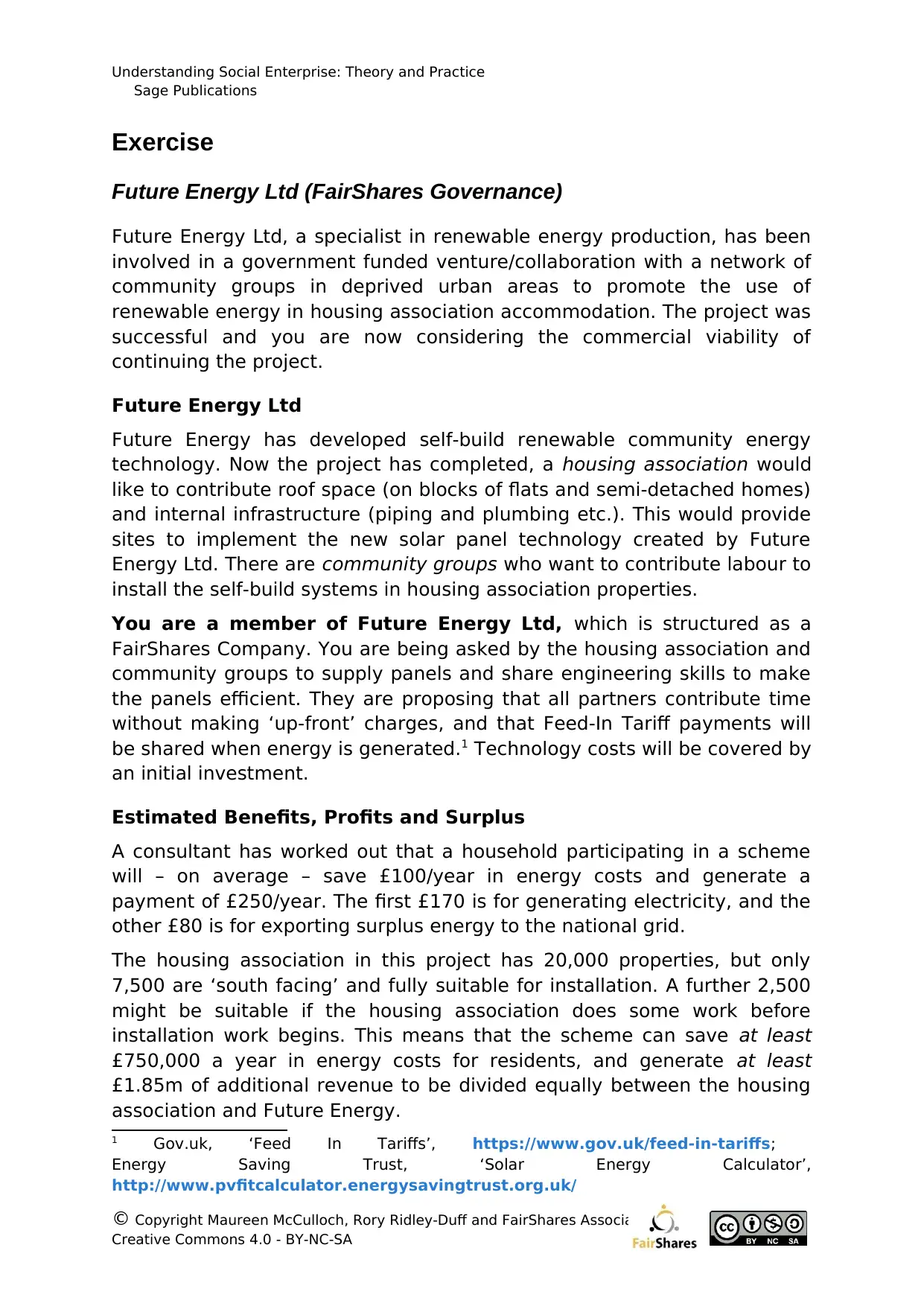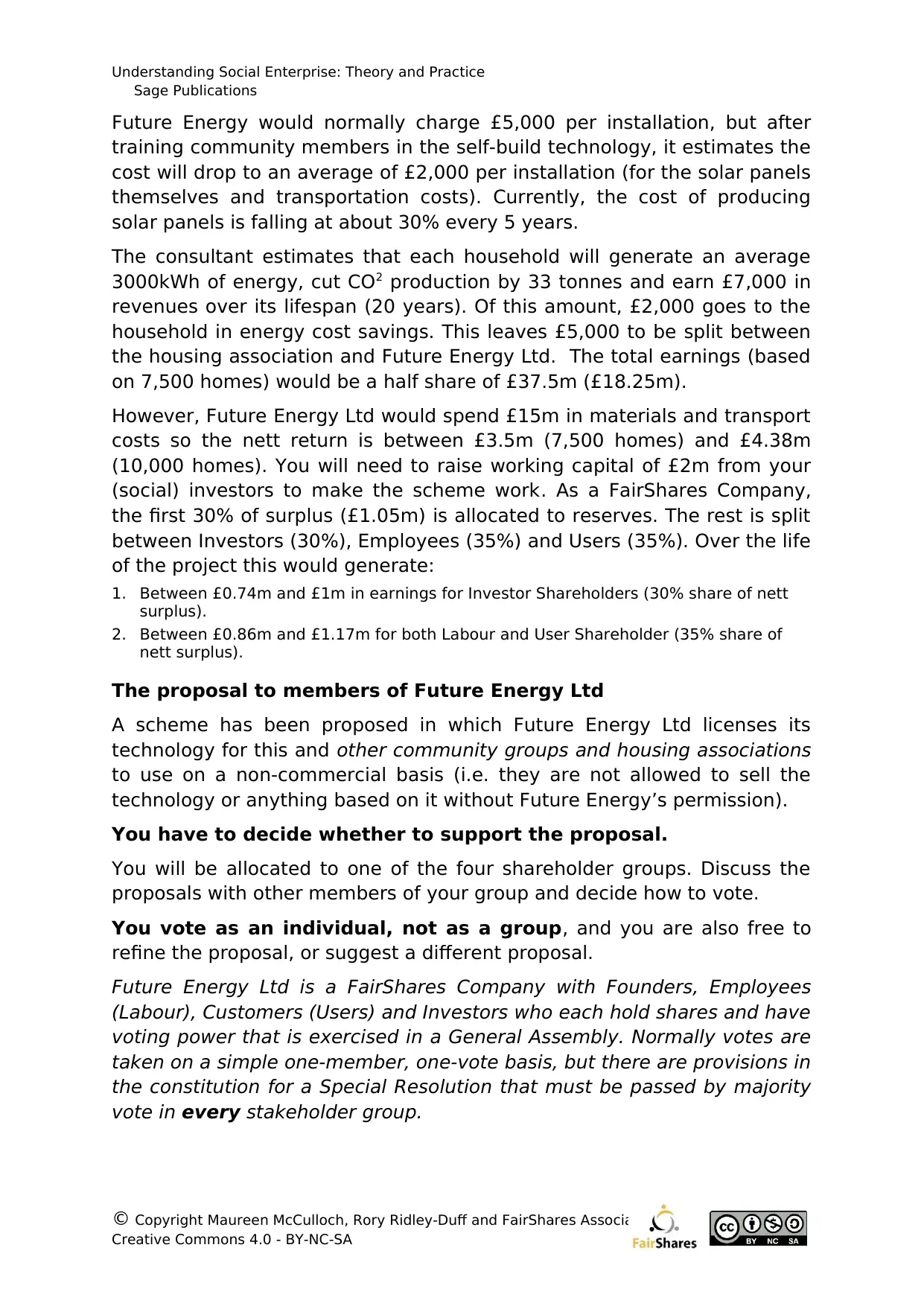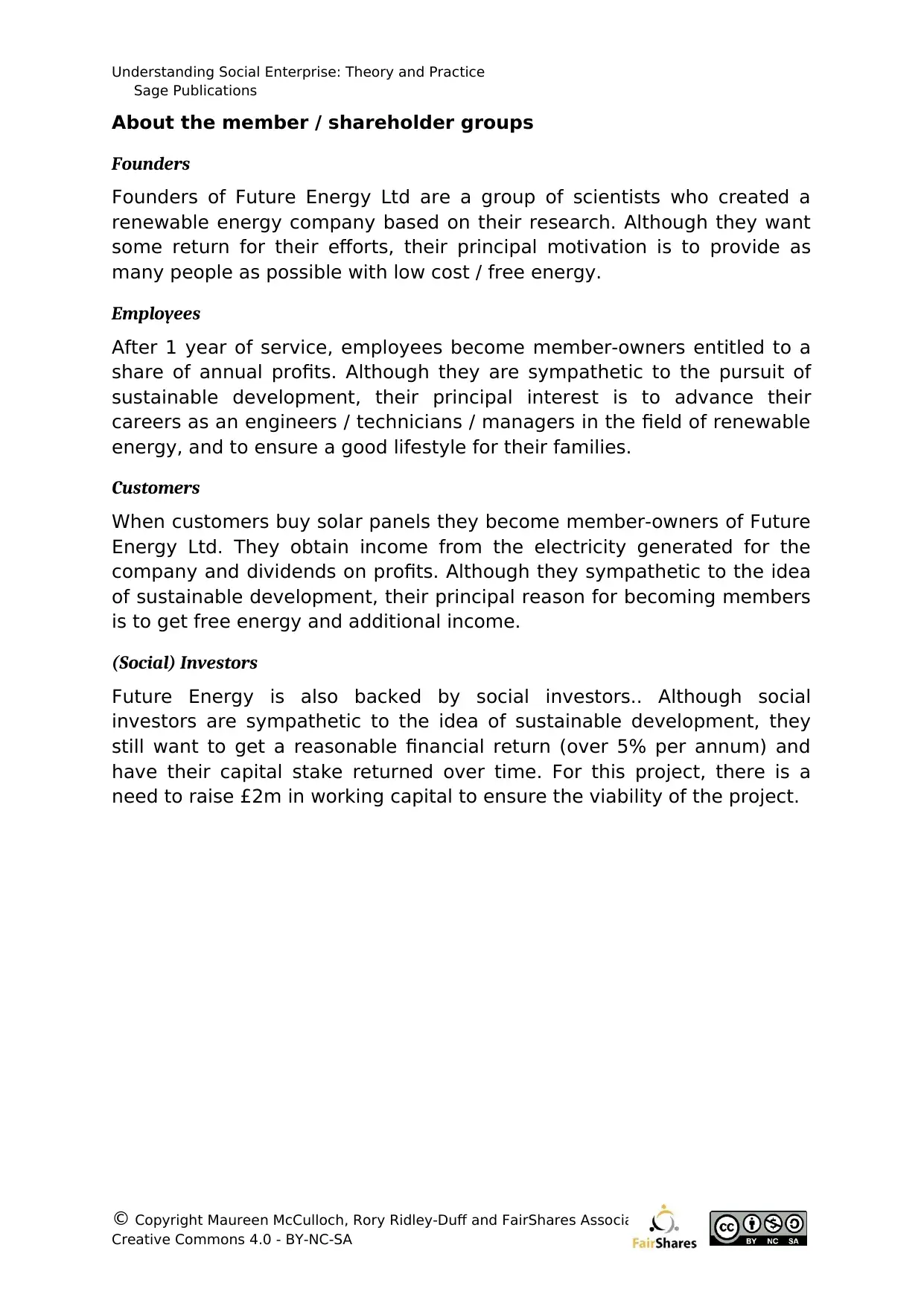Future Energy Ltd: FairShares Governance Case
VerifiedAdded on 2019/09/20
|3
|1110
|497
Case Study
AI Summary
This case study presents a scenario involving Future Energy Ltd, a renewable energy company structured as a FairShares Company, and its potential collaboration with a housing association and community groups. The project aims to implement self-build renewable energy technology in housing association properties, with all partners contributing time and sharing Feed-In Tariff payments. The case study provides financial estimates, including potential savings, revenue generation, and costs, and asks students to analyze the proposal from the perspective of different shareholder groups (Founders, Employees, Customers, and Social Investors). Students are required to discuss the proposal within their assigned group and vote on whether to support it, refine it, or suggest an alternative, considering the unique interests and motivations of each stakeholder group within the FairShares governance model.

Understanding Social Enterprise: Theory and Practice
Sage Publications
Exercise
Future Energy Ltd (FairShares Governance)
Future Energy Ltd, a specialist in renewable energy production, has been
involved in a government funded venture/collaboration with a network of
community groups in deprived urban areas to promote the use of
renewable energy in housing association accommodation. The project was
successful and you are now considering the commercial viability of
continuing the project.
Future Energy Ltd
Future Energy has developed self-build renewable community energy
technology. Now the project has completed, a housing association would
like to contribute roof space (on blocks of flats and semi-detached homes)
and internal infrastructure (piping and plumbing etc.). This would provide
sites to implement the new solar panel technology created by Future
Energy Ltd. There are community groups who want to contribute labour to
install the self-build systems in housing association properties.
You are a member of Future Energy Ltd, which is structured as a
FairShares Company. You are being asked by the housing association and
community groups to supply panels and share engineering skills to make
the panels efficient. They are proposing that all partners contribute time
without making ‘up-front’ charges, and that Feed-In Tariff payments will
be shared when energy is generated.1 Technology costs will be covered by
an initial investment.
Estimated Benefits, Profits and Surplus
A consultant has worked out that a household participating in a scheme
will – on average – save £100/year in energy costs and generate a
payment of £250/year. The first £170 is for generating electricity, and the
other £80 is for exporting surplus energy to the national grid.
The housing association in this project has 20,000 properties, but only
7,500 are ‘south facing’ and fully suitable for installation. A further 2,500
might be suitable if the housing association does some work before
installation work begins. This means that the scheme can save at least
£750,000 a year in energy costs for residents, and generate at least
£1.85m of additional revenue to be divided equally between the housing
association and Future Energy.
1 Gov.uk, ‘Feed In Tariffs’, https://www.gov.uk/feed-in-tariffs;
Energy Saving Trust, ‘Solar Energy Calculator’,
http://www.pvfitcalculator.energysavingtrust.org.uk/
© Copyright Maureen McCulloch, Rory Ridley-Duff and FairShares Association
Creative Commons 4.0 - BY-NC-SA
Sage Publications
Exercise
Future Energy Ltd (FairShares Governance)
Future Energy Ltd, a specialist in renewable energy production, has been
involved in a government funded venture/collaboration with a network of
community groups in deprived urban areas to promote the use of
renewable energy in housing association accommodation. The project was
successful and you are now considering the commercial viability of
continuing the project.
Future Energy Ltd
Future Energy has developed self-build renewable community energy
technology. Now the project has completed, a housing association would
like to contribute roof space (on blocks of flats and semi-detached homes)
and internal infrastructure (piping and plumbing etc.). This would provide
sites to implement the new solar panel technology created by Future
Energy Ltd. There are community groups who want to contribute labour to
install the self-build systems in housing association properties.
You are a member of Future Energy Ltd, which is structured as a
FairShares Company. You are being asked by the housing association and
community groups to supply panels and share engineering skills to make
the panels efficient. They are proposing that all partners contribute time
without making ‘up-front’ charges, and that Feed-In Tariff payments will
be shared when energy is generated.1 Technology costs will be covered by
an initial investment.
Estimated Benefits, Profits and Surplus
A consultant has worked out that a household participating in a scheme
will – on average – save £100/year in energy costs and generate a
payment of £250/year. The first £170 is for generating electricity, and the
other £80 is for exporting surplus energy to the national grid.
The housing association in this project has 20,000 properties, but only
7,500 are ‘south facing’ and fully suitable for installation. A further 2,500
might be suitable if the housing association does some work before
installation work begins. This means that the scheme can save at least
£750,000 a year in energy costs for residents, and generate at least
£1.85m of additional revenue to be divided equally between the housing
association and Future Energy.
1 Gov.uk, ‘Feed In Tariffs’, https://www.gov.uk/feed-in-tariffs;
Energy Saving Trust, ‘Solar Energy Calculator’,
http://www.pvfitcalculator.energysavingtrust.org.uk/
© Copyright Maureen McCulloch, Rory Ridley-Duff and FairShares Association
Creative Commons 4.0 - BY-NC-SA
Paraphrase This Document
Need a fresh take? Get an instant paraphrase of this document with our AI Paraphraser

Understanding Social Enterprise: Theory and Practice
Sage Publications
Future Energy would normally charge £5,000 per installation, but after
training community members in the self-build technology, it estimates the
cost will drop to an average of £2,000 per installation (for the solar panels
themselves and transportation costs). Currently, the cost of producing
solar panels is falling at about 30% every 5 years.
The consultant estimates that each household will generate an average
3000kWh of energy, cut CO2 production by 33 tonnes and earn £7,000 in
revenues over its lifespan (20 years). Of this amount, £2,000 goes to the
household in energy cost savings. This leaves £5,000 to be split between
the housing association and Future Energy Ltd. The total earnings (based
on 7,500 homes) would be a half share of £37.5m (£18.25m).
However, Future Energy Ltd would spend £15m in materials and transport
costs so the nett return is between £3.5m (7,500 homes) and £4.38m
(10,000 homes). You will need to raise working capital of £2m from your
(social) investors to make the scheme work. As a FairShares Company,
the first 30% of surplus (£1.05m) is allocated to reserves. The rest is split
between Investors (30%), Employees (35%) and Users (35%). Over the life
of the project this would generate:
1. Between £0.74m and £1m in earnings for Investor Shareholders (30% share of nett
surplus).
2. Between £0.86m and £1.17m for both Labour and User Shareholder (35% share of
nett surplus).
The proposal to members of Future Energy Ltd
A scheme has been proposed in which Future Energy Ltd licenses its
technology for this and other community groups and housing associations
to use on a non-commercial basis (i.e. they are not allowed to sell the
technology or anything based on it without Future Energy’s permission).
You have to decide whether to support the proposal.
You will be allocated to one of the four shareholder groups. Discuss the
proposals with other members of your group and decide how to vote.
You vote as an individual, not as a group, and you are also free to
refine the proposal, or suggest a different proposal.
Future Energy Ltd is a FairShares Company with Founders, Employees
(Labour), Customers (Users) and Investors who each hold shares and have
voting power that is exercised in a General Assembly. Normally votes are
taken on a simple one-member, one-vote basis, but there are provisions in
the constitution for a Special Resolution that must be passed by majority
vote in every stakeholder group.
© Copyright Maureen McCulloch, Rory Ridley-Duff and FairShares Association
Creative Commons 4.0 - BY-NC-SA
Sage Publications
Future Energy would normally charge £5,000 per installation, but after
training community members in the self-build technology, it estimates the
cost will drop to an average of £2,000 per installation (for the solar panels
themselves and transportation costs). Currently, the cost of producing
solar panels is falling at about 30% every 5 years.
The consultant estimates that each household will generate an average
3000kWh of energy, cut CO2 production by 33 tonnes and earn £7,000 in
revenues over its lifespan (20 years). Of this amount, £2,000 goes to the
household in energy cost savings. This leaves £5,000 to be split between
the housing association and Future Energy Ltd. The total earnings (based
on 7,500 homes) would be a half share of £37.5m (£18.25m).
However, Future Energy Ltd would spend £15m in materials and transport
costs so the nett return is between £3.5m (7,500 homes) and £4.38m
(10,000 homes). You will need to raise working capital of £2m from your
(social) investors to make the scheme work. As a FairShares Company,
the first 30% of surplus (£1.05m) is allocated to reserves. The rest is split
between Investors (30%), Employees (35%) and Users (35%). Over the life
of the project this would generate:
1. Between £0.74m and £1m in earnings for Investor Shareholders (30% share of nett
surplus).
2. Between £0.86m and £1.17m for both Labour and User Shareholder (35% share of
nett surplus).
The proposal to members of Future Energy Ltd
A scheme has been proposed in which Future Energy Ltd licenses its
technology for this and other community groups and housing associations
to use on a non-commercial basis (i.e. they are not allowed to sell the
technology or anything based on it without Future Energy’s permission).
You have to decide whether to support the proposal.
You will be allocated to one of the four shareholder groups. Discuss the
proposals with other members of your group and decide how to vote.
You vote as an individual, not as a group, and you are also free to
refine the proposal, or suggest a different proposal.
Future Energy Ltd is a FairShares Company with Founders, Employees
(Labour), Customers (Users) and Investors who each hold shares and have
voting power that is exercised in a General Assembly. Normally votes are
taken on a simple one-member, one-vote basis, but there are provisions in
the constitution for a Special Resolution that must be passed by majority
vote in every stakeholder group.
© Copyright Maureen McCulloch, Rory Ridley-Duff and FairShares Association
Creative Commons 4.0 - BY-NC-SA

Understanding Social Enterprise: Theory and Practice
Sage Publications
About the member / shareholder groups
Founders
Founders of Future Energy Ltd are a group of scientists who created a
renewable energy company based on their research. Although they want
some return for their efforts, their principal motivation is to provide as
many people as possible with low cost / free energy.
Employees
After 1 year of service, employees become member-owners entitled to a
share of annual profits. Although they are sympathetic to the pursuit of
sustainable development, their principal interest is to advance their
careers as an engineers / technicians / managers in the field of renewable
energy, and to ensure a good lifestyle for their families.
Customers
When customers buy solar panels they become member-owners of Future
Energy Ltd. They obtain income from the electricity generated for the
company and dividends on profits. Although they sympathetic to the idea
of sustainable development, their principal reason for becoming members
is to get free energy and additional income.
(Social) Investors
Future Energy is also backed by social investors.. Although social
investors are sympathetic to the idea of sustainable development, they
still want to get a reasonable financial return (over 5% per annum) and
have their capital stake returned over time. For this project, there is a
need to raise £2m in working capital to ensure the viability of the project.
© Copyright Maureen McCulloch, Rory Ridley-Duff and FairShares Association
Creative Commons 4.0 - BY-NC-SA
Sage Publications
About the member / shareholder groups
Founders
Founders of Future Energy Ltd are a group of scientists who created a
renewable energy company based on their research. Although they want
some return for their efforts, their principal motivation is to provide as
many people as possible with low cost / free energy.
Employees
After 1 year of service, employees become member-owners entitled to a
share of annual profits. Although they are sympathetic to the pursuit of
sustainable development, their principal interest is to advance their
careers as an engineers / technicians / managers in the field of renewable
energy, and to ensure a good lifestyle for their families.
Customers
When customers buy solar panels they become member-owners of Future
Energy Ltd. They obtain income from the electricity generated for the
company and dividends on profits. Although they sympathetic to the idea
of sustainable development, their principal reason for becoming members
is to get free energy and additional income.
(Social) Investors
Future Energy is also backed by social investors.. Although social
investors are sympathetic to the idea of sustainable development, they
still want to get a reasonable financial return (over 5% per annum) and
have their capital stake returned over time. For this project, there is a
need to raise £2m in working capital to ensure the viability of the project.
© Copyright Maureen McCulloch, Rory Ridley-Duff and FairShares Association
Creative Commons 4.0 - BY-NC-SA
⊘ This is a preview!⊘
Do you want full access?
Subscribe today to unlock all pages.

Trusted by 1+ million students worldwide
1 out of 3
Related Documents
Your All-in-One AI-Powered Toolkit for Academic Success.
+13062052269
info@desklib.com
Available 24*7 on WhatsApp / Email
![[object Object]](/_next/static/media/star-bottom.7253800d.svg)
Unlock your academic potential
Copyright © 2020–2025 A2Z Services. All Rights Reserved. Developed and managed by ZUCOL.





